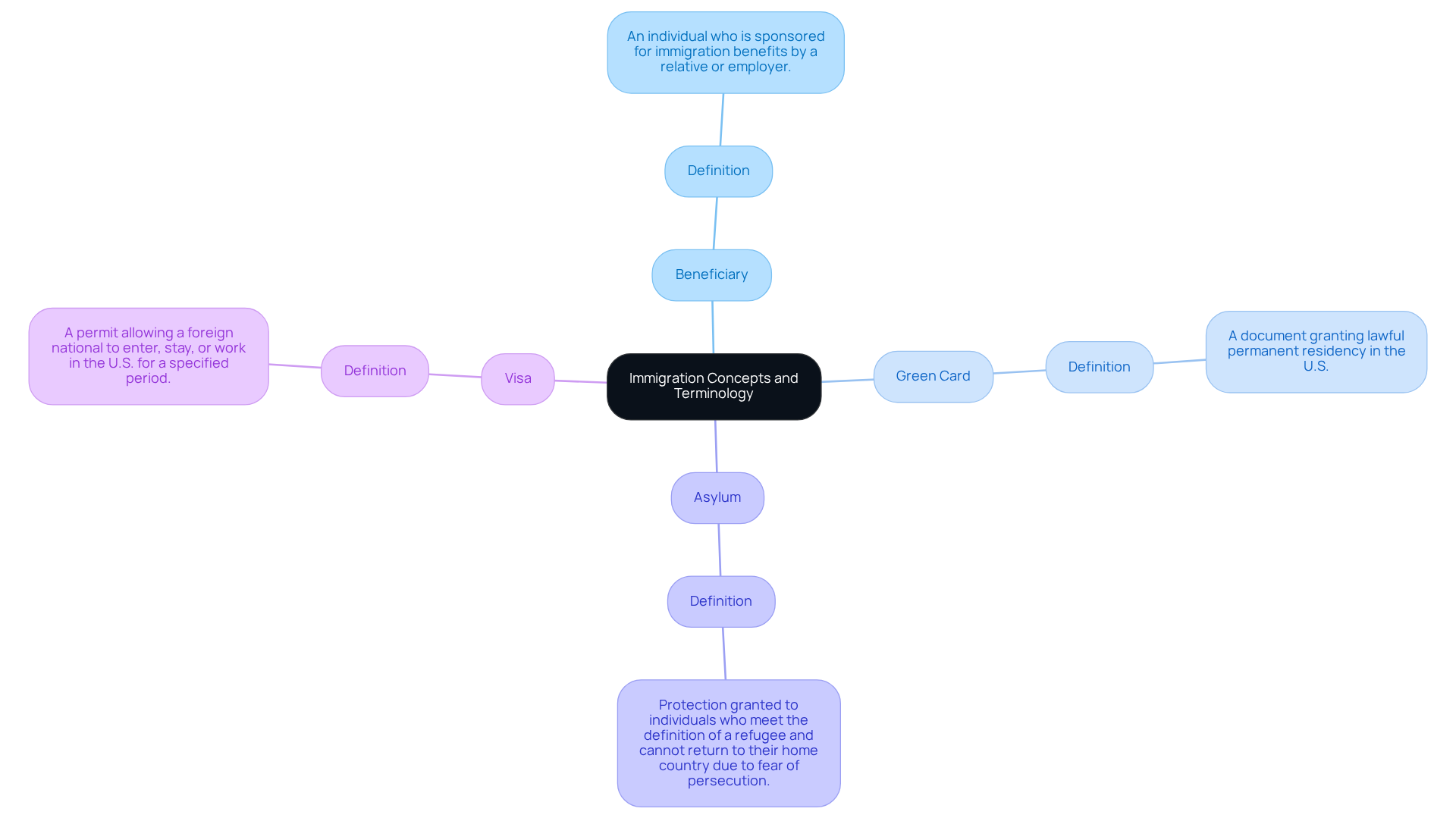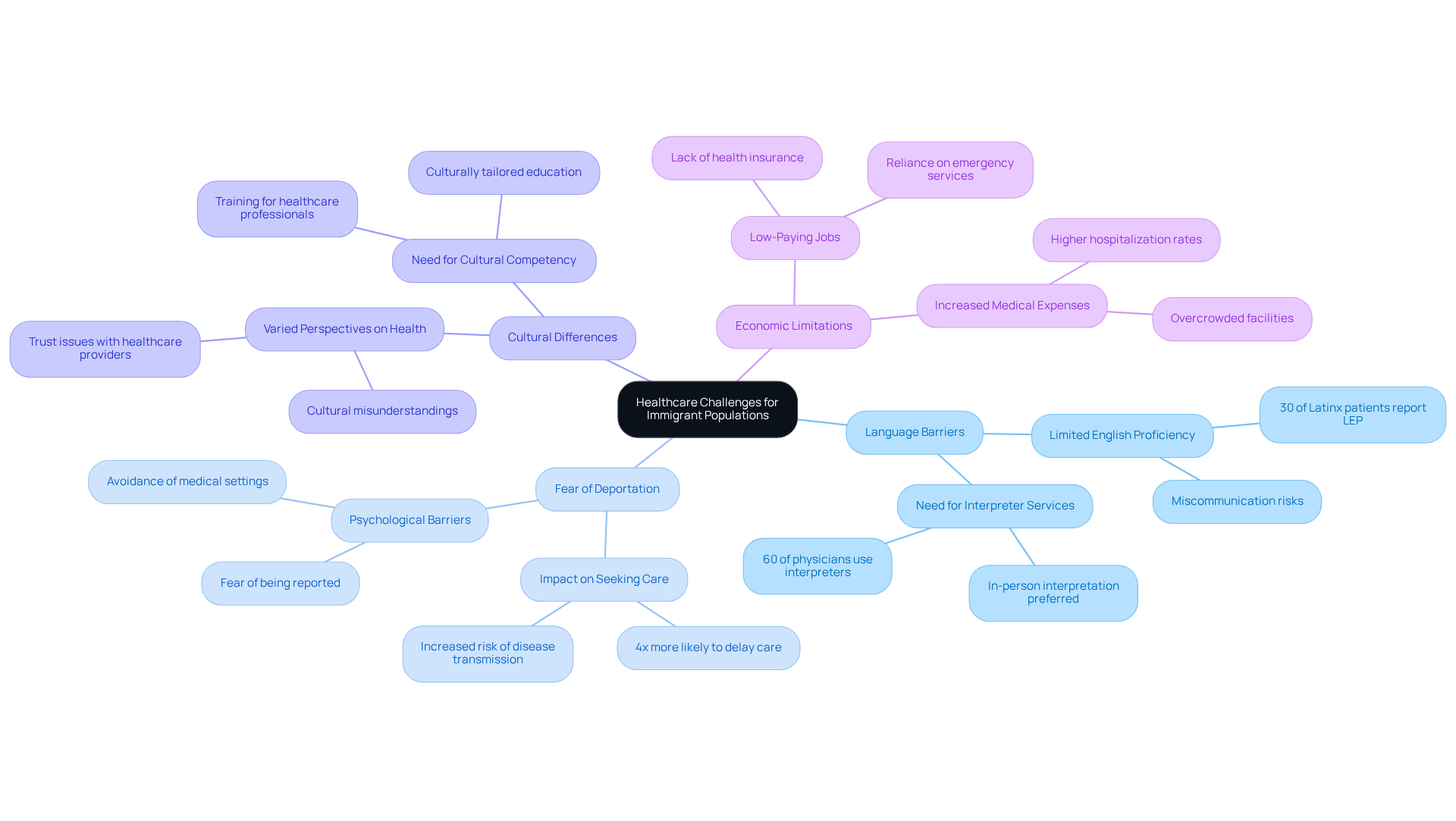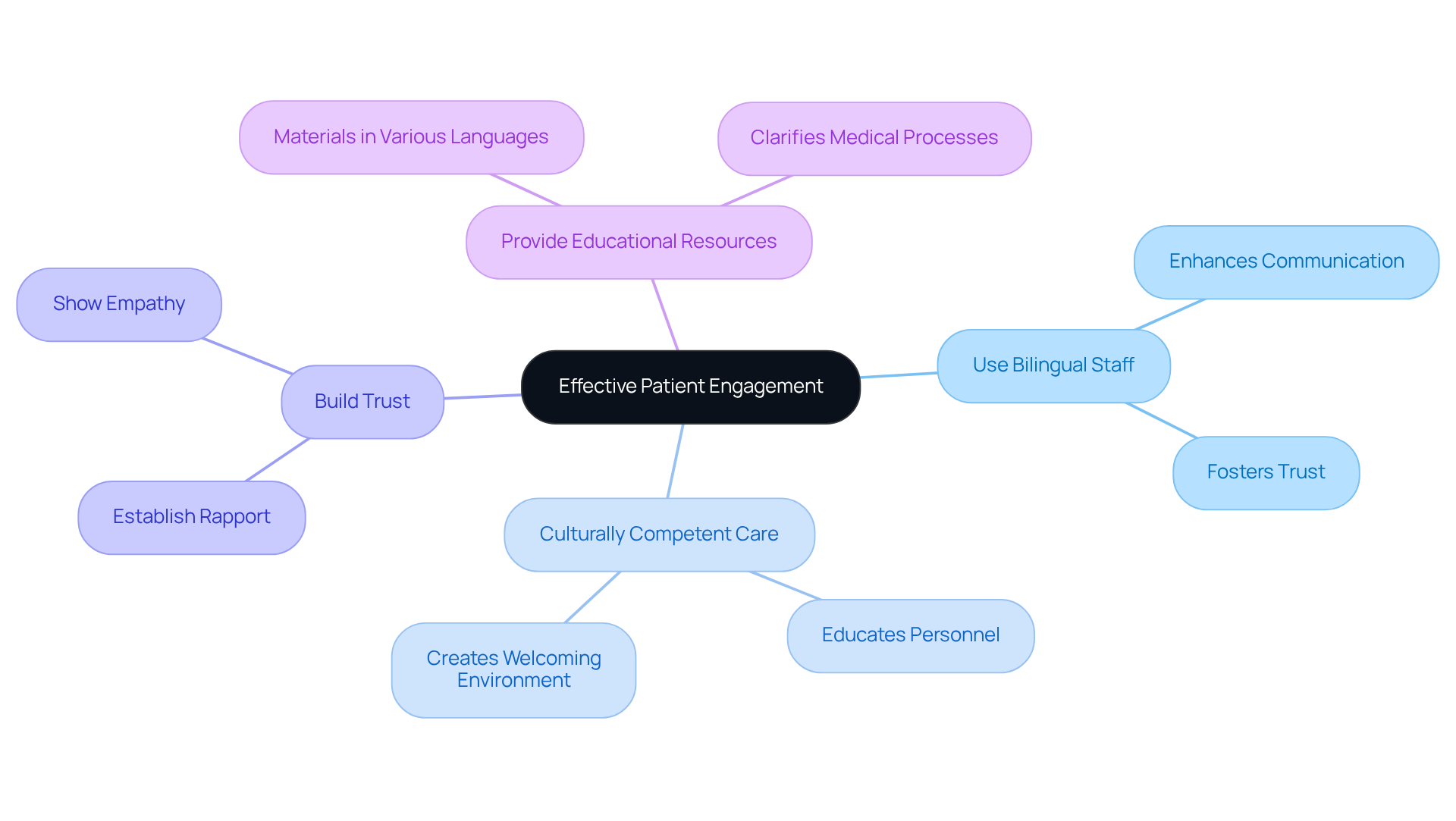Overview
The article "Master Inmigracion: Essential Strategies for Healthcare Workers" highlights the crucial strategies that healthcare professionals can embrace to compassionately support immigrant populations. It’s important to recognize the challenges these individuals face, such as navigating complex immigration terminology and overcoming barriers like language difficulties and fears of deportation. By understanding these obstacles, healthcare workers can implement culturally competent care and communication strategies that significantly enhance patient engagement and access to essential healthcare services.
You may be feeling overwhelmed by the intricacies of providing care to diverse communities. This article serves as a guiding resource, encouraging healthcare professionals to adopt an empathetic approach. By fostering an environment of understanding and respect, we can create a more inclusive healthcare system that truly meets the needs of all patients.
As you read on, consider how these strategies can not only improve patient outcomes but also enrich your professional experience. Together, we can make a meaningful difference in the lives of those we serve, ensuring that every individual receives the compassionate care they deserve.
Introduction
Navigating the complexities of healthcare for immigrant populations presents a unique challenge for medical professionals. It's important to recognize that these individuals often face significant barriers, from language obstacles to fears of deportation. As you work to support them, equipping yourself with essential knowledge and strategies becomes crucial. This article delves into vital immigration terminology that can empower you as a healthcare provider and explores effective methods to engage and support immigrant patients. You may be wondering: how can healthcare professionals bridge the gap between their services and the needs of those who may feel marginalized or fearful?
Clarify Immigration Concepts and Terminology
To effectively support immigrant individuals, it’s vital for those in the medical field to become familiar with essential inmigracion terminology and understand the urgent legal measures that may be necessary in critical situations. Recognizing these terms can empower healthcare professionals to assist those in need more effectively. Here are some key concepts to consider:
- Beneficiary: An individual who is sponsored for immigration benefits by a relative or employer.
- Green Card: A document granting lawful permanent residency in the U.S.
- Asylum: Protection granted to individuals who meet the definition of a refugee and cannot return to their home country due to fear of persecution.
- Visa: A permit allowing a foreign national to enter, stay, or work in the U.S. for a specified period.
Understanding is crucial. It enables healthcare professionals to better assist individuals facing legal emergencies, such as receiving a subpoena or encountering inmigracion enforcement. You may be feeling overwhelmed, and that’s completely understandable. It’s important to remember to encourage individuals to exercise their right to remain silent, request an attorney without delay, and refrain from answering questions without legal representation present. By familiarizing yourself with these terms and the rights of those you care for, you will enhance your ability to communicate effectively and provide the necessary support during their legal challenges. For a comprehensive glossary, please refer to resources like the .

Address Challenges in Healthcare for Immigrant Populations
Immigrant populations encounter significant barriers when accessing healthcare, and it's important to acknowledge these challenges.
- Language Barriers: Many immigrants face difficulties with English proficiency, complicating their ability to express health concerns and understand medical instructions. Nearly one-third of Latinx patients report limited English proficiency, which can lead to misunderstandings that adversely affect their care. With approximately 10.5 million undocumented individuals in the United States experiencing these challenges, are essential.
- Fear of Deportation: The fear of being reported to inmigracion authorities can deter many undocumented immigrants from seeking medical attention. Studies indicate that individuals who fear deportation related to inmigracion are nearly four times more likely to postpone treatment for over two months, risking the worsening of health issues and increasing the likelihood of severe conditions. As medical professionals have observed, individuals who feared seeing a doctor due to concerns about immigration were nearly four times more likely to postpone care for over two months, raising the risk of disease transmission.
- Cultural Differences: Understanding varied cultural perspectives on well-being is vital for fostering trust and enhancing patient interactions. Medical professionals must be aware of these cultural nuances to better serve their patients.
- Economic Limitations: Many newcomers work in low-paying jobs that do not provide health insurance, significantly limiting their access to essential medical services. This economic vulnerability often forces them to rely on emergency services for vital support, contributing to overcrowded facilities and increased medical expenses.
Healthcare professionals must recognize these difficulties and strive to create an inclusive atmosphere that encourages foreign individuals to seek assistance without fear or doubt. By addressing language barriers and offering culturally sensitive support, medical practitioners can significantly improve access and outcomes for these populations. Furthermore, initiatives aimed at enhancing access to primary care and educating individuals about their rights can help alleviate fears associated with inmigracion status.

Implement Strategies for Effective Patient Engagement
To foster effective patient engagement with , it's essential to consider strategies that truly resonate with their needs and experiences related to inmigracion.
- Use Bilingual Staff: Employing bilingual healthcare workers or interpreters can greatly enhance communication, ensuring that patients fully understand their health conditions and treatment options. This approach not only facilitates clarity but also fosters trust.
- Culturally Competent Care: Educating personnel on cultural sensitivity is vital. By enhancing understanding and respect for the diverse backgrounds of newcomers related to inmigracion, healthcare providers can create a more welcoming environment.
- Build Trust: Establishing a rapport with individuals is crucial. Showing empathy and understanding their unique challenges can help alleviate fears and encourage open communication, making patients feel valued and heard.
- Provide Educational Resources: Offering materials in various languages that clarify medical processes, rights, and available services empowers newcomers. This ensures they have the knowledge they need to navigate their healthcare journey confidently.
By implementing these compassionate strategies, healthcare workers can create a more inclusive environment, encouraging inmigracion patients to seek the care they need and deserve.

Conclusion
Understanding the complexities of immigration is critical for healthcare workers who aim to provide effective support to immigrant populations. By mastering essential immigration terminology and recognizing the specific challenges faced by these individuals, healthcare professionals can significantly enhance their ability to deliver compassionate and informed care.
It's important to remember that familiarizing oneself with immigration concepts is just the beginning. Addressing barriers such as language and fear of deportation is vital. Implementing strategies for effective patient engagement can create a safe space for open communication. These insights underscore the necessity for healthcare providers to cultivate an inclusive environment that promotes trust and understanding, ultimately improving health outcomes for immigrant communities.
You may be feeling overwhelmed by these challenges, but it is imperative for healthcare workers to take proactive steps in their practice. By employing bilingual staff, providing culturally competent care, and disseminating educational resources, they can empower immigrant patients to seek the medical attention they need without fear. This approach not only fosters better health for individuals but also strengthens the overall community, reinforcing the vital role that healthcare professionals play in navigating the intricate landscape of immigration and healthcare accessibility.
Frequently Asked Questions
What is the importance of understanding immigration terminology for healthcare professionals?
Understanding immigration terminology is vital for healthcare professionals as it enables them to effectively support immigrant individuals, especially during urgent legal situations.
What does the term "Beneficiary" refer to in immigration?
A Beneficiary is an individual who is sponsored for immigration benefits by a relative or employer.
What is a Green Card?
A Green Card is a document that grants lawful permanent residency in the U.S.
What does Asylum mean in the context of immigration?
Asylum refers to protection granted to individuals who meet the definition of a refugee and cannot return to their home country due to fear of persecution.
What is a Visa?
A Visa is a permit that allows a foreign national to enter, stay, or work in the U.S. for a specified period.
How can healthcare professionals assist individuals facing legal emergencies related to immigration?
Healthcare professionals can assist by encouraging individuals to exercise their right to remain silent, request an attorney without delay, and refrain from answering questions without legal representation present.
Where can healthcare professionals find a comprehensive glossary of immigration terms?
Healthcare professionals can refer to resources like the USCIS Glossary for a comprehensive glossary of immigration terms.




